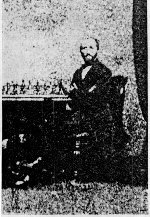Serafino Dubois

|
|
| Serafino Dubois |
|
| Association |
|
| Born | October 10, 1817 Rome , Papal States |
| Died | January 15, 1899 Rome |
| Best Elo rating | 2642 (January 1857) ( historical rating ) |
Serafino Dubois (born October 10, 1817 in Rome , † January 15, 1899 there ) was the most important Italian chess player of the 19th century.
Life and chess career
Dubois grew up in Rome and spent much of his life there. He tried to make a living as a professional player through publications and other activities related to chess. From the late 1840s, Dubois was considered a leading Italian master.
The special chess rules of his homeland made his career difficult. In Italy the law of “free castling ” was valid , that is, the king and rook were allowed to take different possible squares after the jump, including the original position of the other piece (e.g. Re1 and Kh1). There were also other anomalies. Peasants who pass by with a double step could not be defeated en passant . Furthermore, pawns could only be converted into a piece that was already captured. If a piece of his own had not yet been captured, the pawn had to remain on the field of conversion for the time being .
Since larger tournaments started slowly, an ambitious player had to limit himself to competitions against possible rivals at that time. In Rome in 1846 Dubois measured his strength with the top English player Marmaduke Wyvill , to whom he was, however, inferior in the games played without specifications . In the following two decades Dubois fought numerous fights and showed himself to be a match for the strongest opponents. In his most active years Dubois can be counted among the ranks of the world's best chess players. His exact skill level is difficult to gauge, however, as his performance was undoubtedly affected by the difficulty of adapting to the prevailing rules.
Despite this, Dubois stepped onto the international stage with success. In 1855 and 1856 he visited the famous Café de la Régence in Paris and played there against the leading masters. In particular, he defeated Jules Arnous de Rivière in a major competition (+22 = 3 −8).
Dubois had previously had to cancel his participation in the first international chess tournament in London in 1851 for material reasons. In the second London tournament in 1862 he reached fifth place (the winner was Adolf Anderssen ahead of Louis Paulsen ) and placed ahead of the young Wilhelm Steinitz . In a subsequent match, Dubois lost to the eventual world champion with 5.5: 3.5.
In 1863 he moved to the Netherlands. But only two years later, Dubois, who was struggling with health problems, decided to return to his hometown Rome. From then on he worked there to a greater extent as a journalist.
Significance for Italian chess
Dubois was of outstanding importance for Italian chess during his lifetime. He was the only master of international standing and made a name for himself in promoting chess in many ways. For example, in 1859 in Rome, together with Augusto Ferrante, he published the first Italian chess magazine La Rivista degli Scacchi , which, however, soon had to cease publication.
His work was overshadowed by the ongoing discussion about the standardization of international chess rules. For many years Dubois corresponded with French and Russian masters for this purpose. Dubois proved to be a supporter of the existing and tried internationally for the adoption of the Italian special rules. The dispute focused on the castling question, which was of great importance for opening theory. As early as 1845 Dubois had devoted a book written in French to these questions.
Between 1868 and 1874 Dubois published further writings on the openings and on the question of the rules of chess, in which he pleaded in particular for the practice of free castling. It was not until the 1880s that Italy finally made the transition to modern rules. Seen in this light, the use of Dubois had a partially inhibiting effect on Italian chess. In any case, after the delay in joining European chess, the country was no longer able to build on its former top position.
Works
- Les principales ouvertures du jeu des échecs dans les deux manières italienne et française , Rome 1845
- Le principali aperture del giuoco di scacchi sviluppate secondo i due diversi sistemi italiano e francese , two volumes, Rome 1868–1872
- L'arroccamento italiano e l'arroccamento francese e europeo , Rome 1874
See also
literature
- Alessandra Innocenti and Lorenzo Barsi: Serafino Dubois. Il professionista. Messagerie Scacchistice, Brescia 2000.
Web links
- Replayable chess games by Serafino Dubois on chessgames.com (English)
- Jeremy P. Spinrad: Serafino Dubois (Part One ) ( Memento from September 30, 2007 in the Internet Archive ) ( PDF , English; 432 kB)
- Jeremy P. Spinrad: Serafino Dubois (Part Two) ( Memento from September 30, 2007 in the Internet Archive ) (PDF, English; 497 kB)
- Georges Bertola: Serafino Dubois e l'arrocco all'italiana published in Torre & Cavallo Scacco , November 2004 (Italian)
- Alessandra Innocenti and Lorenzo Barsi: Lettera d'autore: ancora su Dubois published in Torre & Cavallo Scacco , January 2005 (Italian)
| personal data | |
|---|---|
| SURNAME | Dubois, Serafino |
| BRIEF DESCRIPTION | Italian chess player |
| DATE OF BIRTH | October 10, 1817 |
| PLACE OF BIRTH | Rome |
| DATE OF DEATH | January 15, 1899 |
| Place of death | Rome |